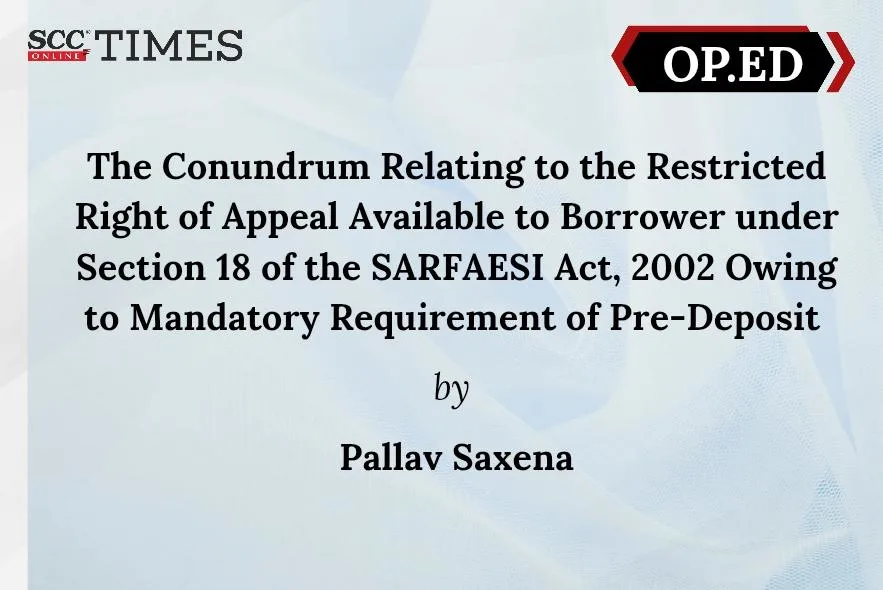The judgment dated 17-4-2025 passed by the Supreme Court in Sunshine Builders & Developers Ltd. v. HDFC Bank Ltd.1 has once again animated the debate with respect to the interpretation of second proviso to Section 18(1)2 of the Securitisation & Reconstruction of Financial Assets & Enforcement of Security Interest Act, 2002 (SARFAESI Act, 2002)3, which was inserted in the statute by the Enforcement of Security Interest and Recovery of Debts Laws (Amendment) Act, 2004 (30 of 2004)4 and made effective retrospectively from 11-11-2004.
To put the matter in its correct perspective, it would be apposite to appreciate that if a borrower as defined by Section 2(f)5 of the Act is aggrieved by an order passed by the Debts Recovery Tribunal under Section 176, he may prefer an appeal against the same to Debts Recovery Appellate Tribunal, albeit with a condition that no appeal shall be entertained unless he deposits with the Debts Recovery Appellate Tribunal 50% of the amount of debt due from him, as claimed by the secured creditor or determined by the Debts Recovery Tribunal, whichever is less. The Appellate Tribunal may, for reasons to be recorded in writing, reduce the amount to not less than 25% of the debt.
The discretion conferred upon Debts Recovery Appellate Tribunal under the third proviso to Section 18(1) of the SARFAESI Act, 2002 is to be exercised on well-established legal principles. The borrower claiming reduction of predeposit from 50% to 25% of the debt is required to demonstrate a strong prima facie case, balance of convenience, irreparable loss and injury and undue hardship, in which regard, reference may be made to Sterlite Technologies Ltd. v. Union of India7 and Satinder Kapur v. IFCI Ltd.8
On the interpretation of second and third proviso to Section 18(1) of the SARFAESI Act, 2002 relating to the mandatory requirement of predeposit, the preponderance of judicial precedents has been in the affirmative. Reference may, inter alia, be made to Narayan Chandra Ghosh v. UCO Bank9, Sidha Neelkanth Papers Industries (P) Ltd. v. Prudent ARC Ltd.10, Kotak Mahindra Bank (P) Ltd. v. Ambuj A. Kasliwal11, Union Bank of India v. Rajat Infrastructure (P) Ltd.12, Chunnu Fashions v. Edelweiss Asset Reconstruction Co. Ltd.13, Aerens Entertainment Zone (P) Ltd. v. Phoenix Arc (P) Ltd.14, Hassad Food Co. QSC v. Reliance Asset Reconstruction Co. Ltd.15, and Sheena Exports v. Assets Care and Reconstruction Enterprises Ltd.16
On the basis of the aforesaid authoritative judicial precedents, no appeal, irrespective of the nature of the order impugned therein, is entertained unless the borrower satisfies the requirement of predeposit. The doctrine of exhaustion of alternative/statutory remedies becomes the basis of rejection of a writ petition challenging an interlocutory order passed by the Debts Recovery Tribunal in circumvention of the appellate remedy. The borrower, in cases of bona fide business failure, is already in dire straits when he faces recovery proceedings under the SARFAESI Act, 2002 and, therefore, to satisfy the requirement of predeposit, more so, to get an appeal entertained assailing an interlocutory order, carries an ominous potential to expose him to irretrievable injury and prejudice.
It is in the aforesaid context that the recent judgment dated 17-4-2025 in Sunshine Builders & Developers case17 assumes enormous significance. The said judgment indicates a paradigm shift in the jurisprudence relating to interpretation of second and third proviso to Section 18(1) of the SARFAESI Act, 2002. It would be germane to refer to the judgment dated 22-12-2011 passed by the Debts Recovery Appellate Tribunal, Delhi in “Shree Engg. Industries (P) Ltd. v. United Bank of India”18, wherein it was held that in an appeal where the appellant does not claim relief of stay of enforcement measures and which emanates from an interlocutory order of Debts Recovery Tribunal seized of adjudication of an application under Section 17 of the SARFAESI Act, 2002, would not attract the mandatory requirement of predeposit. The view taken in judgment dated 17-4-2025 in Sunshine Builders & Developers case19 is not only reasonable but also addresses the concerns relating to miscarriage of justice in case erroneous procedural orders passed by the Debts Recovery Tribunals having a material bearing on the final decision are not corrected in appellate proceedings only for the reason that the borrower lacks the financial wherewithal of making the predeposit. In fact, it would not be an exaggeration to suggest that on basis of the judgment dated 17-4-2025 in Sunshine Builders & Developers case20, appropriate amendments are brought about in the statute with expedition, lest the cause of justice would be the ultimate casualty.
*Senior Advocate. Author can be reached at: advpallavsaxena@gmail.com.
1. 2025 SCC OnLine SC 1234.
2. Securitisation and Reconstruction of Financial Assets and Enforcement of Security Interest Act, 2002, S. 18(1).
3. Securitisation and Reconstruction of Financial Assets and Enforcement of Security Interest Act, 2002.
4. Enforcement of Security Interest and Recovery of Debts Laws (Amendment) Act, 2004.
5. Securitisation and Reconstruction of Financial Assets and Enforcement of Security Interest Act, 2002, S. 2(f).
6. Securitisation and Reconstruction of Financial Assets and Enforcement of Security Interest Act, 2002, S. 17.
16. 2019 SCC OnLine Del 10055.
17. 2025 SCC OnLine SC 1234.
19. 2025 SCC OnLine SC 1234.
20. 2025 SCC OnLine SC 1234.


